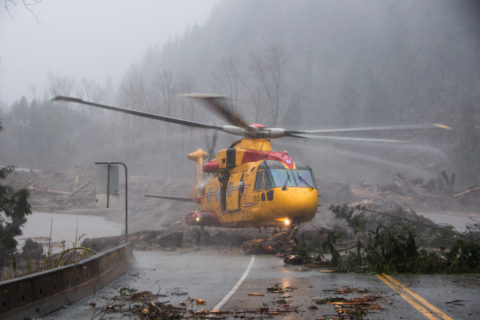World War Two
Published 20 Nov 2021After months of stubborn defense the time has finally come for the Soviet counterstroke, but is it in time to save Stalingrad? And can the Allies reach Tunis and take all of North Africa before the Axis can reinforce?
(more…)
November 21, 2021
The Red Army Kicks Ass – Operation Uranus! – WW2 – 169 – November 20th, 1942
British Columbia’s annus horribilis
In The Line, Jen Gerson does a distressingly good imitation of Cassandra’s warnings … and just like Cassandra, her words are probably going to be ignored until things get much worse:

“A job well done by @RCAF_ARC’s 442 Transport & Rescue Squadron. Using 3 CH149 helicopters and supported by a CC115 Buffalo, the Sqn evacuated 311 people, 26 Dogs and a Cat to safety in Agassiz after being trapped by landslides on roads in BC.
RCAF Operations, Nov 16, 2021 (https://twitter.com/RCAFOperations/status/1460664604648947721)”
So now here it is. We have flooding so acute that we are airlifting food supplies to small towns in British Columbia cut off by destroyed transport routes that it may take weeks to repair. The damage has cut off rail and road links from the city of Vancouver to the rest of Canada. Not only does this trap all the rail and truck resources now stranded in the isolated areas, it also cuts off one of the largest ports in North America in the midst of a global supply chain crisis.
On top of that, many of those economists who told us inflation was not going to happen are now hedging their bets. Oh, and we are still dealing with a pandemic, and its lingering health and economic damage.
Once again we have proven ourselves utterly dependent on the military to manage a domestic crisis — a military that is so profoundly underfunded and under equipped that it has reached a state of generational decline. (For more on that, read Matt Gurney’s piece in The Line from yesterday [linked here].)
Meanwhile, we’ve been writing here at The Line about the utter collapse of our institutional capacity; the unavoidable fact that our governments seem totally unable to anticipate obvious, immediate, and pressing disasters. A recent example of that came from the federal government’s failure to sound the alarm on COVID-19 back in 2020. However, the residents of British Columbia sure didn’t get the same kind of notice of imminent danger that their American counterparts surely did.
God help us if a really bad winter storm hits somewhere in this country over the next six to eight weeks. Another severe ice storm, or a real blizzard; I genuinely fear we would have people starving to death in their homes for lack of resources to spare to dig them out.
I am a 37-year-old woman who had never seen an empty shelf in a grocery store until COVID-19. Now I’m seeing scenes out of Kamloops supermarkets that look like something out of The Walking Dead. No serious shortages in 35 years — and now I’ve seen two episodes of panic buying clearing out the shelves in the past two.
We keep on acting as if this disaster is the peak. This is the worst year ever, and we’re going to get back to normal any minute now.
Maybe.
But what if we don’t?
SA80 History: XL60 Series in 4.85mm
Forgotten Weapons
Published 10 May 2017Armament Research Services (ARES) is a specialist technical intelligence consultancy, offering expertise and analysis to a range of government and non-government entities in the arms and munitions field. For detailed photos of the guns in this video, don’t miss the ARES companion blog post:
http://armamentresearch.com/british-e…
Once the basic configuration of the new British rifle was determined, the next step was to build a series of prototypes. The design that took form was basically a bullpup copy of the Armalite AR-18. The design team at Enfield were mostly senior draftsmen, with virtually no firearms experience among them. To make things worse, most of the design team was regularly rotated onto other projects, preventing them from developing any project experience on the rifle.
Several prototype batches were made (typically of a dozen guns each, both IWs and LSWs), all in the unique British 4.85x49mm cartridge, with a variety of different feature sets. Through the different patterns, configurations would change on the safety (push button vs lever) fire selector (push button vs lever), and magazine catch (straight-in side lever vs rock-in side lever vs rock-in rear paddle). At this time, plans still existed to make both left- and right-handed versions of the final gun, so prototypes of both were manufactured.
Because cost-cutting measures had not yet been forced on the project, these XL-60 series guns were generally reliable, at least in normal conditions. They are quite comfortable to fire, with a cartridge very similar to the 5.56mm NATO in practical terms. There is nothing particularly wrong with that cartridge, but it would be dropped when it lost NATO trials to the Belgian SS109 … but we will address that in the next episode of the SA80 history.
http://www.patreon.com/ForgottenWeapons
Cool Forgotten Weapons merch! http://shop.bbtv.com/collections/forg…
If you enjoy Forgotten Weapons, check out its sister channel, InRangeTV! http://www.youtube.com/InRangeTVShow
QotD: Britain’s middle class after WW1
One of the most important developments in England during the past twenty years has been the upward and downward extension of the middle class. It has happened on such a scale as to make the old classification of society into capitalists, proletarians and petit bourgeois (small property-owners) almost obsolete.
England is a country in which property and financial power are concentrated in very few hands. Few people in modern England own anything at all, except clothes, furniture and possibly a house. The peasantry have long since disappeared, the independent shopkeeper is being destroyed, the small business-man is diminishing in numbers. But at the same time modern industry is so complicated that it cannot get along without great numbers of managers, salesmen, engineers, chemists and technicians of all kinds, drawing fairly large salaries. And these in turn call into being a professional class of doctors, lawyers, teachers, artists, etc., etc. The tendency of advanced capitalism has therefore been to enlarge the middle class and not to wipe it out as it once seemed likely to do.
But much more important than this is the spread of middle-class ideas and habits among the working class. The British working class are now better off in almost all ways than they were thirty years ago. This is partly due to the efforts of the Trade Unions, but partly to the mere advance of physical science. It is not always realized that within rather narrow limits the standard of life of a country can rise without a corresponding rise in real-wages. Up to a point, civilization can lift itself up by its boot-tags. However unjustly society is organized, certain technical advances are bound to benefit the whole community, because certain kinds of goods are necessarily held in common. A millionaire cannot, for example, light the streets for himself while darkening them for other people. Nearly all citizens of civilized countries now enjoy the use of good roads, germ-free water, police protection, free libraries and probably free education of a kind. Public education in England has been meanly starved of money, but it has nevertheless improved, largely owing to the devoted efforts of the teachers, and the habit of reading has become enormously more widespread. To an increasing extent the rich and the poor read the same books, and they also see the same films and listen to the same radio programmes. And the differences in their way of life have been diminished by the mass-production of cheap clothes and improvements in housing. So far as outward appearance goes, the clothes of rich and poor, especially in the case of women, differ far less than they did thirty or even fifteen years ago. As to housing, England still has slums which are a blot on civilization, but much building has been done during the past ten years, largely by the local authorities. The modern council house, with its bathroom and electric light, is smaller than the stockbroker’s villa, but it is recognizably the same kind of house, which the farm labourer’s cottage is not. A person who has grown up in a council housing estate is likely to be – indeed, visibly is – more middle class in outlook than a person who has grown up in a slum.
George Orwell, “The Lion And The Unicorn: Socialism and the English Genius”, 1941-02-19.




